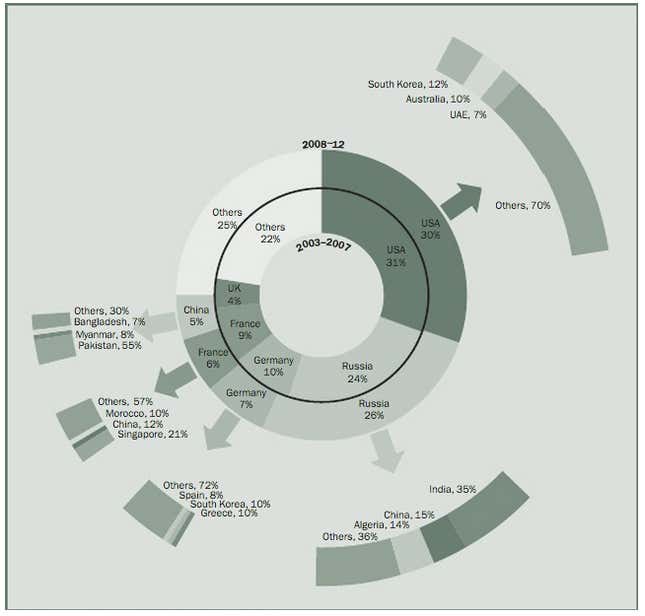Syrian rebels appear to use a FN-6 anti-aircraft missile to shoot down a helicopter.
Arms dealing is a competitive business, and brand name recognition matters—just look at the AK-47. China is supporting Bashar al-Assad’s regime in the Syrian civil war, but that inconvenient fact hasn’t stopped its arms industry from hoping that Assad’s opponents can give Chinese weapons a little bit of a profile boost. Sadly for the manufacturers, the publicity might not be all that positive.
In 2012, for the first time ever, China cracked the top five international arms-dealing countries tracked by the Stockholm International Research Institute for Peace, selling 5% of the world’s conventional weapons:

When it comes to Syria, China has made deals to sell it missile technology in the past, and along with Russia, has been the main supporter of Assad’s regime on the international stage as it battles with a disparate alliance of rebel groups.
Those rebel groups have been arming themselves with anything they can find or make, while asking international donors to make up the rest; the US has approved plans to ship small arms to certain resistance groups. But while the US weapons are generally seen as either too little, too late to affect the protracted conflict, or too likely to end up in the hands of anti-American groups, China’s FN-6 has attracted more interest because the shoulder-fired, heat-seeking anti-aircraft missile gives a key advantage to insurgents without air support: They can fight back against Assad’s aircraft.
But if China is backing Syria’s government, how are its weapons winding up in the hands of the rebels trying to destroy it?
New York Times war correspondent CJ Chivers tracked down the answer: One of the countries that China has sold arms to is Sudan, the perpetual pariah state in Africa. Today, Sudan is cash-strapped enough to re-sell those weapons to other countries, including Syria.
When the rockets started turning up in rebel videos like the one above earlier this year, arms analysts in China were quick to see the benefits. The state-owned Global Times cited an analyst predicting the conflict would boost arms sales: “In regards to export prospects, Chinese weapons need to engage in more conflicts to prove their value… the kills are proof that the FN-6 is reliable and user-friendly, because rebel fighters are generally not well-trained in operating missile systems.”
However, according to Chivers’ discussions with a rebel leader, the FN-6 wasn’t proving to be such a great advertisement for Chinese prowess after all. The rockets often malfunctioned and two had exploded, killing and injuring nearby rebels.